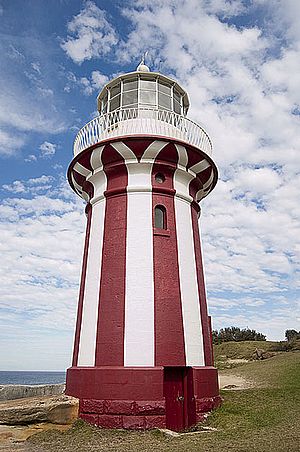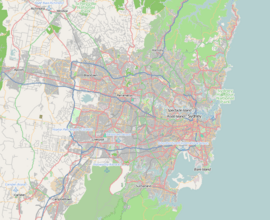Hornby Lighthouse facts for kids
 |
|
| Hornby Lighthouse, 2010 | |
|
|
|
| Location | South Head, Sydney, New South Wales, Australia |
|---|---|
| Coordinates | 33°50′1″S 151°16′52″E / 33.83361°S 151.28111°E |
| Year first constructed | 1858 |
| Automated | 1933 |
| Construction | Sandstone tower |
| Tower shape | Cylindrical tower with balcony and lantern |
| Markings / pattern | Striped vertically red and white tower, white gallery and lantern |
| Height | 9.1 metres (30 ft) |
| Focal height | 27.4 metres (90 ft) |
| Original lens | First order catoptric lens |
| Range | 14 nautical miles (26 km; 16 mi) |
| Characteristic | L Fl W 5s. |
| Admiralty number | K2636 |
| NGA number | 111-6180 |
| ARLHS number | AUS-093 |
Hornby Lighthouse, also known as South Head Lower Light, is a famous lighthouse located at the very tip of South Head in Sydney, Australia. It stands proudly at the entrance to Sydney Harbour, guiding ships safely in and out. This lighthouse is special because it's the third oldest one in New South Wales. It helps ships avoid dangerous underwater rocks called South Reef.
Contents
History of Hornby Lighthouse
The idea for a lighthouse at the entrance to Sydney Harbour came after two terrible shipwrecks. In August 1857, the ship Dunbar was lost, and 121 people died. Just two months later, in October 1857, the Catherine Adamson also sank, taking 21 lives. These tragedies showed how important it was to have a clear light guiding ships.
Building the Lighthouse
A committee quickly decided that a lighthouse was needed. They recommended building a 30-foot (9.1 m) lighthouse on the inner South Head. It would show a steady white light. The government already had a special lens called a catoptric lens, which had been bought in 1853.
The lighthouse was designed by Mortimer Lewis, who was the Colonial Architect at the time. Construction finished in 1858. This made Hornby Lighthouse the third lighthouse built in New South Wales. The first was Macquarie Lighthouse (1818), and the second was Nobbys Head Light (1858).
Opening and Early Years
Hornby Lighthouse was officially opened by Sir William Denison, who was the Governor of New South Wales. It was named after his wife's family, the Hornbys. People also called it the "Lower Light" to tell it apart from Macquarie Lighthouse, which was the "Upper Light."
The lighthouse originally used a kerosene lamp and the special catoptric lens. A keeper's cottage was built next to the lighthouse. A second cottage was added in 1860. In 1897, the cottages finally got city water, after years of using stored rainwater.
Modern Updates and Automation
Over the years, the lighthouse was updated. In 1904, the light was changed to incandescent gas. Then, in 1933, it was made electric. This meant the lighthouse could be automated, and keepers were no longer needed to live there.
In 1948, a new type of lens was put in, and the light's pattern was changed. It now flashes white: two seconds on, three seconds off. This light can be seen from about 15 nautical miles away.
Life After Automation
After the lighthouse became automated in 1933, the cottages were not used for a while. During World War II, the Army took control of the area. They used the cottages to house married soldiers until 1977.
In 1975, the National Trust recognized the lighthouse as important. The Army then handed the site over to the National Parks and Wildlife Service. They fixed up the cottages and put caretakers in charge.
Description of Hornby Lighthouse
Hornby Lighthouse is a very noticeable landmark in Sydney. It has been used since the 1840s to control ships entering and leaving Sydney Harbour.
Lighthouse Structure
The lighthouse tower is made of solid sandstone and is shaped like a tapered cylinder. It stands about 30 feet (9.1 m) tall. The sandstone was dug up from nearby areas. The tower is painted with bright red and white vertical stripes, making it easy to spot.
At the very top of the tower, there is a metal balcony and railing. This area, painted white, surrounds the glass room where the lamp is kept.
Keeper Cottages
Next to the lighthouse are two Georgian style sandstone cottages. They are also made from the same local sandstone. These cottages have timber verandas and white picket fences. The original slate roofs have been replaced with corrugated asbestos.
The main building, designed by Mortimer Lewis, is made of solid sandstone. It has four levels and a basement carved into the rock. The top level has a metal and wood walkway. The roof has a small spire called a fleche. The design is simple but classic, with steps, decorative lines, and small oval or square windows.
Condition and Changes
As of 1998, the property, including its timber picket fence, was in good condition and well looked after. The main change over time has been the replacement of the original slate roofs on the cottages with asbestos cement sheeting.
Visiting Hornby Lighthouse
The light itself is managed by the Sydney Ports Corporation. The land and buildings are looked after by the National Parks and Wildlife Service. They are part of the Sydney Harbour National Park.
You can visit the lighthouse site. It's open to the public, but you cannot go inside the tower. You can reach it by walking along the South Head Heritage Trail, which starts at Camp Cove.
Heritage Importance
Hornby Lighthouse is listed on the New South Wales State Heritage Register. This means it is a very important historical site that needs to be protected. It was added to the register on 18 April 2000. It is recognized as a key landmark that has been used for shipping control for a long time.
Images for kids
 | Valerie Thomas |
 | Frederick McKinley Jones |
 | George Edward Alcorn Jr. |
 | Thomas Mensah |






